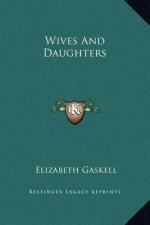‘Very odd,’ said the squire. Roger said nothing, although he naturally felt some curiosity. He went into the drawing-room, not quite aware that his father was following him. Osborne sate at a table near the fire, pen in hand, looking over one of his poems, and dotting the i’s, crossing the t’s, and now and then pausing over the alteration of a word.
‘Oh, Roger!’ he said, as his brother came in, ’here’s been Lord Hollingford wanting to see you.’
‘I know,’ replied Roger.
’And he’s left a note for you. Robinson tried to persuade him it was for my father, so he’s added a “junior” (Roger Hamley, Esq., junior) in pencil.’ The squire was in the room by this time, and what he had overheard rubbed him up still more the wrong way. Roger took his unopened note and read it.
‘What does he say?’ asked the squire.
Roger handed him the note. It contained an invitation to dinner to meet M. Geoffroi St H—,’ whose views on certain subjects Roger had been advocating in the article Lord Hollingford had spoken about to Molly, when he danced with her at the Hollingford ball. M. Geoffroi St H—was in England now, and was expected to pay a visit at the Towers in the course of the following week. He had expressed a wish to meet the author of the paper which had already attracted the attention of the French comparative anatomists; and Lord Hollingford added a few words as to his own desire to make the acquaintance of a neighbour whose tastes were so similar to his own; and then followed a civil message from Lord and Lady Cumnor.
Lord Hollingford’s hand was cramped and rather illegible. The squire could not read it all at once, and was enough put out to decline any assistance in deciphering it. At last he made it out.
’So my lord lieutenant is taking some notice of the Hamleys at last. The election is coming on, is it? But I can tell him we’re not to be got so easily. I suppose this trap is set for you, Osborne? What’s this you’ve been writing that the French mounseer is so taken with?’
‘It is not me, sir!’ said Osborne. ‘Both note and call are for Roger.’
‘I don’t understand it,’ said the squire. ’These Whig fellows have never done their duty by me; not that I want it of them. The Duke of Debenham used to pay the Hamleys a respect due to ’em—the oldest landowners in the county—but since he died, and this shabby Whig lord has succeeded him, I’ve never dined at the lord lieutenant’s once—no, not once.’
’But I think, sir, I’ve heard you say Lord Cumnor used to invite you,— only you did not choose to go,’ said Roger.
’Yes. What d’ye mean by that? Do you suppose I was going to desert the principles of my family, and curry favour of the Whigs? No! leave that to them. They can ask the heir of the Hamleys fast enough when a county election is coming on.’




